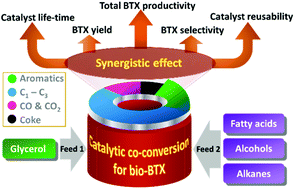Catalytic conversion of glycerol and co-feeds (fatty acids, alcohols, and alkanes) to bio-based aromatics: remarkable and unprecedented synergetic effects on catalyst performance†
Abstract
Glycerol is an attractive bio-based platform chemical that can be converted to a variety of bio-based chemicals. We here report a catalytic co-conversion strategy where glycerol in combination with a second (bio-)feed (fatty acids, alcohols, alkanes) is used for the production of bio-based aromatics (BTX). Experiments were performed in a fixed bed reactor (10 g catalyst loading and WHSV of (co-)feed of 1 h−1) at 550 °C using a technical H-ZSM-5/Al2O3 catalyst. Synergistic effects of the co-feeding on the peak BTX carbon yield, product selectivity, total BTX productivity, catalyst life-time, and catalyst regenerability were observed and quantified. Best results were obtained for the co-conversion of glycerol and oleic acid (45/55 wt%), showing a peak BTX carbon yield of 26.7 C%. The distribution of C and H of the individual co-feeds in the BTX product was investigated using an integrated fast pyrolysis-GC-Orbitrap MS unit, showing that the aromatics are formed from both glycerol and the co-feed. The results of this study may be used to develop optimized co-feeding strategies for BTX formation.



 Please wait while we load your content...
Please wait while we load your content...